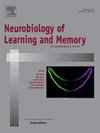类维生素a在食欲调节后记忆重新巩固和消退中的作用。
IF 1.8
4区 心理学
Q3 BEHAVIORAL SCIENCES
引用次数: 0
摘要
维甲酸是维生素A的活性代谢物,是脊椎动物突触可塑性和学习记忆过程中的重要信号分子。我们已经证明,它也在无脊椎动物(lynaea stagnation)的操作性条件反射和经典条件反射后的长期记忆形成中发挥作用。在检索之后,最近的长期记忆可以经历额外的加工,从而在重新巩固期间更新和重新稳定,或在消失期间被抑制。在这里,我们研究维甲酸是否参与提取后记忆加工,利用食欲经典条件反射的淋巴细胞。我们表明,暴露于类视黄醛信号抑制剂会不同程度地破坏记忆再巩固,这取决于蛋白质合成的需要和接受的训练程度。我们还表明,无论训练程度如何,在类视黄醛抑制剂和蛋白质合成抑制剂的存在下,记忆消退都受到抑制。这些发现表明类维生素a在提取后内隐记忆的继续加工中起作用。本文章由计算机程序翻译,如有差异,请以英文原文为准。
The role of retinoids in memory reconsolidation and extinction following appetitive conditioning
Retinoic acid, the active metabolite of vitamin A, is an important signaling molecule during vertebrate synaptic plasticity and learning and memory. We have shown that it also plays a role in long-term memory formation following both operant and classical conditioning in the invertebrate, Lymnaea stagnalis. Following retrieval, recent long-term memories can undergo additional processing whereby they can be updated and re-stabilized during reconsolidation, or suppressed during extinction. Here, we examined whether retinoic acid is involved in post-retrieval memory processing by utilizing appetitive classical conditioning of Lymnaea. We show that exposure to retinoid signaling inhibitors differentially disrupts memory reconsolidation, depending on the need for protein synthesis and the extent of training received. We also show that memory extinction is inhibited in the presence of both retinoid inhibitors and protein synthesis inhibitors, regardless of the extent of training. These findings suggest that retinoids play a role in the continued processing of implicit memories following retrieval.
求助全文
通过发布文献求助,成功后即可免费获取论文全文。
去求助
来源期刊
CiteScore
5.10
自引率
7.40%
发文量
77
审稿时长
12.6 weeks
期刊介绍:
Neurobiology of Learning and Memory publishes articles examining the neurobiological mechanisms underlying learning and memory at all levels of analysis ranging from molecular biology to synaptic and neural plasticity and behavior. We are especially interested in manuscripts that examine the neural circuits and molecular mechanisms underlying learning, memory and plasticity in both experimental animals and human subjects.

 求助内容:
求助内容: 应助结果提醒方式:
应助结果提醒方式:


